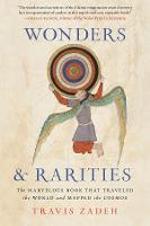During the thirteenth century, the Persian naturalist and judge Zakariyya’ Qazwini authored what became one of the most influential works of natural history in the world: Wonders and Rarities. Exploring the dazzling movements of the stars above, the strange minutiae of the minerals beneath the earth, and everything in between, Qazwini offered a captivating account of the cosmos. Wonders and Rarities inspired generations as it traveled through madrasas and courts, unveiling the magical powers of nature. But Qazwini’s compendium eventually came to stand as a strange, if beautiful, emblem of medieval ignorance. Restoring Qazwini to his place as a herald of the rare and astonishing, Travis Zadeh dramatically revises the place of wonder in the history of Islamic philosophy, science, and literature. Wonder provided an enduring way to conceive of the world-at once constituting an affective reaction, an aesthetic stance, a performance of piety, and a cognitive state. Yet through the course of colonial modernity, Qazwini’s universe of marvels helped advance the notion that Muslims lived in a timeless world of superstition and enchantment, unaware of the western hemisphere or the earth’s rotation around the sun. Recovering Qazwini’s ideas and his reception, Zadeh invites us into a forgotten world of thought, where wonder mastered the senses through the power of reason and the pleasure of contemplation.

Wonders and rarities : the marvelous book that traveled the world and mapped the cosmos
ISBN: 9780674299337
Format: Paperback
Publisher: Harvard University Press
Origin: US
Release Date: July, 2025

